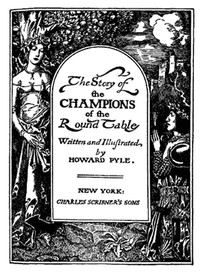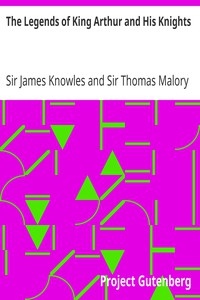The Story of the Champions of the Round Table, Howard Pyle [the beginning after the end read novel .TXT] 📗

- Author: Howard Pyle
Book online «The Story of the Champions of the Round Table, Howard Pyle [the beginning after the end read novel .TXT] 📗». Author Howard Pyle
"Lord," said King Angus, "I do believe that God hath raised up a defender for me in this extremity. For Sir Tristram of Lyonesse came to me yesterday, and offered for to take this quarrel of mine upon him. Now I do not believe that there is any better knight in all of Christendom than he, wherefore I am to-day uplifted with great hopes that mine innocence shall be proved against mine accuser."
"Ha!" quoth King Arthur, "if Sir Tristram is to stand thy champion in this affair, then I do believe that thou hast indeed found for thyself a very excellent, worthy defender."
So anon there came Sir Tristram riding to that place, attended only by Gouvernail. And he was clad all in bright, polished armor so that he shone like a star of great splendor as he entered the field of battle. He came straight to where King Arthur sat and saluted before him. King Arthur said, "Sir, what knight art thou?" "Lord," answered he, "I am Sir Tristram of Lyonesse, and I am come to champion King Angus who sits beside you. For I believe him to be innocent of that matter of which he is accused, and I will emperil my body in that belief for to prove the truth of the same."
"Well," quoth King Arthur, "this King accused hath, certes, a very noble champion in thee. So go and do thy devoirs, and may God defend the right."
Thereupon each knight took a good stout spear into his hand and chose his place for the encounter, and each set his shield before him and feutered his lance in rest. Then, when each was ready, the marshal blew a great blast upon his trumpet, and thereupon, in an instant, each knight launched against the other like a bolt of thunder. So they met in the very middle of the course with such violence that the spear of each knight was shattered all into pieces unto the very truncheon thereof. Each horse fell back upon his haunches, and each would no doubt, have fallen entirely, had not the knight-rider recovered his steed with the greatest skill and address.
Then each knight voided his saddle and each drew his sword and set his shield before him. Therewith they came to battle on foot like two wild boars--so fiercely and felly that it was terrible to behold. For they traced this way and that and foined and struck at one another so that whole pieces of armor were hewn from the bodies of each.
But in all this battle Sir Tristram had so much the better that, by and by after they had fought for above an hour, Sir Blamor de Ganys began to bare back before him, and to give ground, holding his shield low for weariness. This Sir Tristram perceived, and, running in suddenly upon Sir Blamor, he struck him so terrible a blow upon the right shoulder that Sir Blamor's arm was altogether benumbed thereby, and he could no longer hold his sword in his hand.
So the sword of Sir Blamor fell down into the grass, and Sir Tristram, perceiving this, ran and set his foot upon it. Then Sir Blamor could not stand any longer, but fell down upon his knees because of a great weariness and faintness that lay upon him like the weariness and faintness of approaching death.
Then Sir Tristram said: "Sir Knight, thou canst fight no longer. Now I bid thee for to yield thyself to me as overcome in this battle."
Thereunto Sir Blamor made reply, speaking very deep and hollow from out of his helmet: "Sir Knight, thou hast overcome me by thy strength and prowess, but I will not yield myself to thee now nor at any time. For that would be so great shame that I would rather die than endure it. I am a knight of the Round Table, and have never yet been overcome in this wise by any man. So thou mayst slay me, but I will not yield myself to thee."
Then Sir Tristram cried out: "Sir Knight, I beseech thee to yield thyself, for thou art not fit to fight any more this day."
Sir Blamor said, "I will not yield, so strike and have done with it."
So Sir Tristram wist not what to do, but stood there in doubt looking down upon Sir Blamor. Then Sir Blamor said, again: "Strike, Sir Knight, and have done with it."
Upon this Sir Tristram said: "I may not strike thee, Sir Blamor de Ganys, to slay thee, for thou art very nigh of blood to Sir Launcelot of the Lake, and unto him I have sworn brotherhood in arms; wherefore I pray thee now to yield thyself to me."
Sir Blamor said, "Nay, I will not yield me to thee."
"Well," said Sir Tristram, "then I must fain act this day in a manner like as I acted yesterday."
Therewith speaking, he took his sword into both his hands and he swung it several times around his head and when he had done that he flung it to a great distance away, so that he was now entirely unarmed saving only for his misericordia. After that he gave Sir Blamor his hand and lifted him up upon his feet. And he stooped and picked up Sir Blamor's sword out of the grass and gave it back to Sir Blamor into his hands, and he said: "Sir Knight, now thou art armed and I am entirely unarmed, and so thou hast me at thy mercy. Now thou shalt either yield thyself to me or slay me as I stand here without any weapon; for I cannot now strike thee, and though I have overcome thee fairly yet thou hast it now in thy power to slay me. So now do thy will with me in this matter."
Then Sir Blamor was greatly astonished at the magnanimity of Sir Tristram, and he said, "Sir Knight, what is thy name?" Sir Tristram said, "It is Tristram, surnamed of Lyonesse."
Upon this Sir Blamor came to Sir Tristram and put his arms about his shoulders, and he said: "Tristram, I yield myself to thee, but in love and not in hate. For I yield myself not because of thy strength of arms (and yet I believe there is no knight in the world, unless it be my cousin Sir Launcelot of the Lake, who is thy peer), but I yield me because of thy exceeding nobility. Yet I would that I might only be satisfied that this King of Ireland is no traitor."
"Messire," said Sir Tristram, "of that I have assured myself very strongly ere I entered into this contest, wherefore I may now freely avouch upon mine own knightly word that he is innocent."
"Then," said Sir Blamor, "I also am satisfied, and I herewith withdraw all my impeachment against him."
Then those two noble, excellent knights took one another by the hand and went forward together to where King Arthur sat in high estate, and all those who looked on and beheld that reconciliation gave loud acclaim. And when King Arthur beheld them coming thus, he arose from where he sat and met them and embraced them both, and he said: "I do not believe that any king can have greater glory in his life than this, to have such knights about him as ye be."
So ended this famous battle with great glory to Sir Tristram and yet with no disregard to that famous knight against whom he did battle.
After that, they and King Arthur and King Angus of Ireland and all the court went up unto the castle of Camelot, and there the two knights-combatant were bathed in tepid water and their wounds were searched and dressed and they were put at their ease in all ways that it was possible.
Now that very day, as they all sat at feast in the castle of Camelot, there came one with news that the name of Sir Tristram had suddenly appeared upon one of the seats of the Round Table. So after they had ended their feast they all immediately went to see how that might be. When they came to the pavilion of the Round Table, there, behold! was his name indeed upon that seat that had once been the seat of King Pellinore. For this was the name that now was upon that seat:
So the next day Sir Tristram was duly installed as a knight-companion of the Round Table with a great pomp and estate of circumstance, and a day or two after that he set sail for Ireland with King Angus, taking with him Gouvernail and those Cornish knights who were his companions.
So they all reached Ireland in safety, and, because Sir Tristram had aided the King of Ireland in the day of his extremity, the Queen forgave him all the despite she held against him, so that he was received at the court of the King and Queen with great friendship and high honor.
For a while Sir Tristram dwelt in Ireland and said nothing concerning that purpose for which he had come. Then one day he said to King Angus: "Lord, thou art not to forget to fulfil that promise which thou madst to me concerning the Lady Belle Isoult."
To this King Angus made reply: "I had hoped that now we were come to Ireland you had changed your purpose in that matter. Are you yet of the same mind as when you first spake to me?"
"Yea," said Sir Tristram, "for it cannot be otherwise."
"Well, then," said King Angus, "I shall go to prepare my daughter for this ill-hap that is to befall her, though indeed it doth go against my heart to do such a thing. After I have first spoken to her, you are to take the matter into your own hands, for, to tell you the truth, I have not the heart to contrive it further."
So King Angus went away from where Sir Tristram was, and he was gone a long while. When he returned he said: "Sir, go you that way and the Lady Belle Isoult will see you."
So Sir Tristram went in the direction King Angus had said, and a page showed him the way. So by and by he came to where the Lady Belle Isoult was, and it was a great chamber in a certain tower of the castle and high up Under the eaves of the roof.
The Lady Belle Isoult stood upon the farther side of this chamber so that the light from





Comments (0)